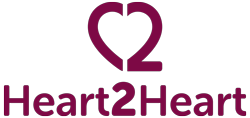Prenatal Diagnosis
Download this information sheet as a PDF
The aim of this information sheet is to give you information if your baby is diagnosed with a congenital heart condition before they are born.
When do congenital heart conditions happen?
The heart is formed between the sixth and twelfth week of pregnancy and it is at this time that the problem can start.
What causes congenital heart conditions?
It is still not clear what causes congenital heart conditions. There are certain factors that may increase the risk of having a baby with a heart condition. These include:
- rubella (German measles), diabetes and viral infections during pregnancy;
- drinking alcohol or taking drugs during pregnancy;
- a family history of congenital heart disease – if either parent or a brother or sister has a congenital heart condition, this may increase the risk; and
- some chromosomal disorders, for example, people with Down’s syndrome often also have a congenital heart condition.
It is important to remember that doctors usually do not know the cause of the congenital heart condition.
What is a foetal heart scan?
A foetal heart scan is performed if doctors think there may be a problem with your baby’s heart. The scan is an ultrasound examination of the heart and is normally carried out at 18 to 22 weeks. However, due to advances in scanning technology, it is now possible for scans to be performed from around 13 weeks onwards. Your scan will take place in a specialist paediatric cardiac centre (sometimes called a foetal cardiology centre).
Preparing for the scan
Many people find it helpful to have someone with them during the scan so you may want to consider taking your partner, a relative or a friend along. It is best to arrive 15 minutes before your appointment to give the medical team plenty of time to explain the procedure to you.
What will happen during the scan?
The scan is very similar to a normal ultrasound scan, except that it will concentrate on examining your baby’s heart. This usually involves checking the four main chambers of the heart (atria and ventricles) and also examining the two major vessels (aorta and pulmonary artery) as they leave the heart. This examination will help to identify any problems with the structure, function or rhythm of your baby’s heart.
At the end of the appointment, once the scan is finished, the medical team will tell you the result.
Finding out more
If your baby has a heart condition, you should be able to ask the doctor any question you like. The doctor, normally a foetal or paediatric heart cardiologist should explain to you:
- the precise nature of the heart condition;
- the treatment that may be needed after birth; and
- the general long term outlook.
We have fact sheets explaining all the most common heart conditions. You can order these by contacting us on our freephone infoline 0808 808 5000 or you can download the fact sheets from our website –www.chfed.org.uk.
Questions to ask
Finding out your child has a heart condition can be very upsetting and it can be hard to take everything in. Do not worry if you think of more questions after your appointment. You can always book another appointment with the doctor.
Some questions you may want to ask are shown below.
- What is the name of the heart condition?
- What will happen when my baby is born?
- When will my baby need surgery?
- Where is the best place to treat this condition?
- Where can I get a second opinion?
- Where can I get more help? Is there a support group?
Before you leave
Before you leave the centre, you may want to do the following.
- Check that you will be receiving a detailed letter about the consultation, and that your GP will get a copy.
- Ask for a second appointment (you can always cancel it) for a few days ahead, as you may have found more questions to ask by then.
- Write down the contact details and names of the people you have seen.
- Write down the name of the heart condition (or the condition which is suspected). You may want to ask the doctor to draw a diagram as well to help with the explanation.
- Ask if there is a specialist counsellor attached to the centre and how to contact them.
- Ask what they will be telling your referring consultant and how they will pass the information to your antenatal unit.
More support and information
If you feel you need someone to talk to, call us on our freephone infoline 0808 808 5000. We can put you in contact with other parents who know what it is like to be told that their child has a heart condition.
Other fact sheets that you may be interested in
- Heart disorders (a range of information on the most common heart disorders)
- Talking to doctors
- Causes of congenital heart disease
Your notes
| Name of doctor: |
| Address and telephone number of the paediatric cardiac unit: |
| Other people you may need to speak to (e.g. cardiac liaison nurse): |
| Date of next appointment: |
Evidence and sources of information for this CHF information sheet can be obtained at:
(1) National Institute for Health & Care Excellence. Structural Heart Defects Overview. London: NICE; 2017. Available at:
https://pathways.nice.org.uk/pathways/structural-heart-defects
(2) NHS Choices. Congenital Heart Disease. London: NHS; 2017. Available at:
www.nhs.uk/conditions/congenital-heart-disease/pages/Introduction.aspx
About this document:
Published: June 2013
Reviewed: May 2022
To inform CHF of a comment or suggestion, please contact us via info@chfed.org.uk or Tel: 0300 561 0065.









